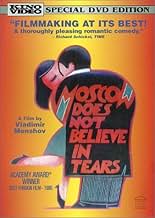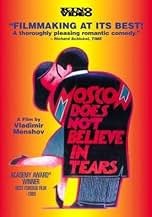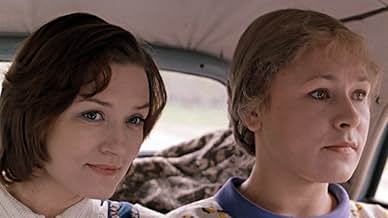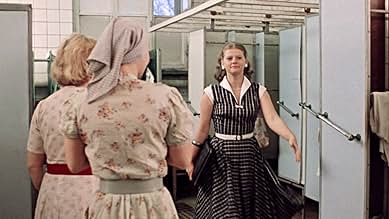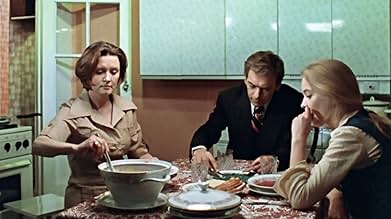AVALIAÇÃO DA IMDb
8,0/10
15 mil
SUA AVALIAÇÃO
Esta é a história de vida de três noivas desde a juventude até o outono. Seus sonhos e desejos, amor e decepções.Esta é a história de vida de três noivas desde a juventude até o outono. Seus sonhos e desejos, amor e decepções.Esta é a história de vida de três noivas desde a juventude até o outono. Seus sonhos e desejos, amor e decepções.
- Direção
- Roteiristas
- Artistas
- Ganhou 1 Oscar
- 3 vitórias e 1 indicação no total
Vladlen Paulus
- Pyotr Lednev
- (as V. Paulus)
- Direção
- Roteiristas
- Elenco e equipe completos
- Produção, bilheteria e muito mais no IMDbPro
Avaliações em destaque
This is a tribute to the Soviet era some people in Ukraine still consider to be the best years of their lives.I saw the movie in my child years, but didn't pay much attention to it. Now, when I study film history and techniques, the movie revealed to me some dark sides. "Moskva sliezam nie verit", I guess, tells a story of a humble Soviet woman in pursuit for happiness with a beloved man. This woman does not care about feminism. True love of a man-"stronghold", a man who is ready to comfort her any time she needs--that is what she is searching for in life. The movie shows some cloudy moments in the way to happiness three female friends go along. And the movie ends up where it should--an "island of placid" I watch it in original. Have to say, many phrases from the movie are cited in Ukrainian and Russian-speaking communities these days.
10akoumare
This was one of the last movies I have seen before leaving Russia. I am watching it every time with a lot of pleasure. It is funny, and touching to tears some moments. It is also very realistic, as many women in Russia went through the same problems as the three girls, and it touches most of people in Russia. It is also showing that it is never late to restart and suceed in your life, and in spite of difficulties it is possible to reach your goal and success (whatever it means for you).
Being of Russian descent and a first generation Australian, I first saw this film in the original Russian a year or two after it came out. At the time I thought it was one of the funniest things I had seen in a long long time. I saw it again when our World Movie channel broadcast it and I laughed just as hard and just as long. To understand the comedy in what appears to be a story of feminist angst you need to be Russian. There is no other way to see it. We don't see that the supposed conflict between between the heroine and her lover is that she is a manager and he is not. It's much more primal than that. It is because she EARNS more than he does. Women held managerial positions in the USSR since they first began driving tanks and tractors during the second world war. Most of us are brought up to believe that we can do just about anything, and a lot of the time we have to. So please, if you see this film, remember to laugh. Remember that Yes, Russians aren't happy unless they're miserable but the story of this film is also about the joy of rebuilding lives and relationships for both men and women and about the triumph of the human spirit over seemingly impossible odds.
This is one of the most captivating love stories I've ever seen on film. It starts with a young woman (Katya, played by Vera Alentova) reporting to her Worker's Dormitory friends that she has flunked by two points the exam to get into university. It ends with the most incredible sweetness of life.
It is like a French film done by a Russian company (which is what it is). The Moscow we see that does not believe in tears does believe in love, and it is not a Moscow of politics, although some people do call one another "comrade." This is a woman's point of view film (a "chick flick") that transcends any genre cage. It begins slowly, almost painfully dull in a way that will remind the viewer of all the clichés about Russia, the unstylish dress, the worker's paradise that isn't, the sharp contrast between Moscow and the peasants who live outside the city. Katya works in a factory. She works at a drill press. She is obviously underemployed. Lyudmila (Irina Muravyova) works in a bakery. She is probably gainfully employed for the time and place. They are friends, twentysomethings who are on the make for a man, but not a man from the sticks. They pretend to be university post docs or something close to that and they impress some people as they house-sit a beautiful Moscow apartment.
This is how their adult life begins in a sense. Lyudmila falls in love with an athlete; Katya becomes infatuated with a television cameraman. One thing leads to another and before we know it they are forty. Neither relationship worked out. The athlete becomes an alcoholic, the cameraman, in the sway of his mother, believes that Katya is beneath him (once he finds out that she works in a factory). How wrong he is, of course.
But no more of the plot. I won't spoil it. The plot is important. The characterizations are important. The story is like a Russian novel in that it spans lots of time, but once you are engaged you will find that the two and a half hours fly by and you will, perhaps like me, say at the end "What a great movie!" My hat is off to director Vladimir Menshov and to Valentin Chernykh who wrote the script and to the cast. I've mentioned Vera Alentova and Irina Muravyova, but Aleksey Batlov who played Gosha was also excellent. I don't want to say anymore. Just watch the film. It is one of the best I've ever seen.
(Note: Over 500 of my movie reviews are now available in my book "Cut to the Chaise Lounge or I Can't Believe I Swallowed the Remote!" Get it at Amazon!)
It is like a French film done by a Russian company (which is what it is). The Moscow we see that does not believe in tears does believe in love, and it is not a Moscow of politics, although some people do call one another "comrade." This is a woman's point of view film (a "chick flick") that transcends any genre cage. It begins slowly, almost painfully dull in a way that will remind the viewer of all the clichés about Russia, the unstylish dress, the worker's paradise that isn't, the sharp contrast between Moscow and the peasants who live outside the city. Katya works in a factory. She works at a drill press. She is obviously underemployed. Lyudmila (Irina Muravyova) works in a bakery. She is probably gainfully employed for the time and place. They are friends, twentysomethings who are on the make for a man, but not a man from the sticks. They pretend to be university post docs or something close to that and they impress some people as they house-sit a beautiful Moscow apartment.
This is how their adult life begins in a sense. Lyudmila falls in love with an athlete; Katya becomes infatuated with a television cameraman. One thing leads to another and before we know it they are forty. Neither relationship worked out. The athlete becomes an alcoholic, the cameraman, in the sway of his mother, believes that Katya is beneath him (once he finds out that she works in a factory). How wrong he is, of course.
But no more of the plot. I won't spoil it. The plot is important. The characterizations are important. The story is like a Russian novel in that it spans lots of time, but once you are engaged you will find that the two and a half hours fly by and you will, perhaps like me, say at the end "What a great movie!" My hat is off to director Vladimir Menshov and to Valentin Chernykh who wrote the script and to the cast. I've mentioned Vera Alentova and Irina Muravyova, but Aleksey Batlov who played Gosha was also excellent. I don't want to say anymore. Just watch the film. It is one of the best I've ever seen.
(Note: Over 500 of my movie reviews are now available in my book "Cut to the Chaise Lounge or I Can't Believe I Swallowed the Remote!" Get it at Amazon!)
Moscow Does Not Believe In Tears is an appealing comedy-drama with much to say about Soviet society from the 1950s to the 1970s. The cast deliver standout performances, and this is the film's greatest strength. The story is about their lives. The city's scenery is often featured, with cinematography that's good for a Soviet drama film. The score, however, is standard fare, but there are a few notable songs. Considering its high entertainment value it's no wonder that Moscow Does Not Believe In Tears became one of the most popular films in the Soviet Union. It even won an Academy Award for Best Foreign Language Film in 1980. It's just one of those films where everyone involved in making it contributed to a result that delivers on all fronts. If the acting or the direction was worse then the result could have been another forgettable drama. Soviet filmmakers, however, specialized in drama films. This is because of the restrictions that were put on them by the government. Many good dramas were released during the Soviet period, and Moscow Does Not Believe In Tears is one of the most memorable. I definitely recommend seeing it.
Você sabia?
- CuriosidadesOne of four Russian films ever to win Academy Award for Best Foreign Language Film. The other are Guerra e Paz (1965), Dersu Uzala (1975) and O Sol Enganador (1994).
- Erros de gravaçãoWhen Lyudmila and her friend approach the office building she is wearing a pair of white shoes. Once inside the building the shoes color changes to black.
- Citações
Lyudmila Gurina: Don't cry.
Lyudmila Gurina: You know what Moscow thinks of tears.
Lyudmila Gurina: We shouldn't be sitting around, we should do something.
- ConexõesFeatured in Amor e Pombos (1985)
- Trilhas sonorasAleksandra, Aleksandra
Written by Sergey Nikitin and Dmitry Suharev and Yuri Vizbor
Performed by Tatyana Nikitina and Sergey Nikitin
Principais escolhas
Faça login para avaliar e ver a lista de recomendações personalizadas
- How long is Moscow Does Not Believe in Tears?Fornecido pela Alexa
Detalhes
- Data de lançamento
- País de origem
- Central de atendimento oficial
- Idioma
- Também conhecido como
- Moscow Does Not Believe in Tears
- Locações de filme
- Empresas de produção
- Consulte mais créditos da empresa na IMDbPro
Bilheteria
- Orçamento
- US$ 900.000 (estimativa)
- Faturamento bruto mundial
- US$ 217
- Tempo de duração
- 2 h 30 min(150 min)
- Proporção
- 1.37 : 1
Contribua para esta página
Sugerir uma alteração ou adicionar conteúdo ausente


